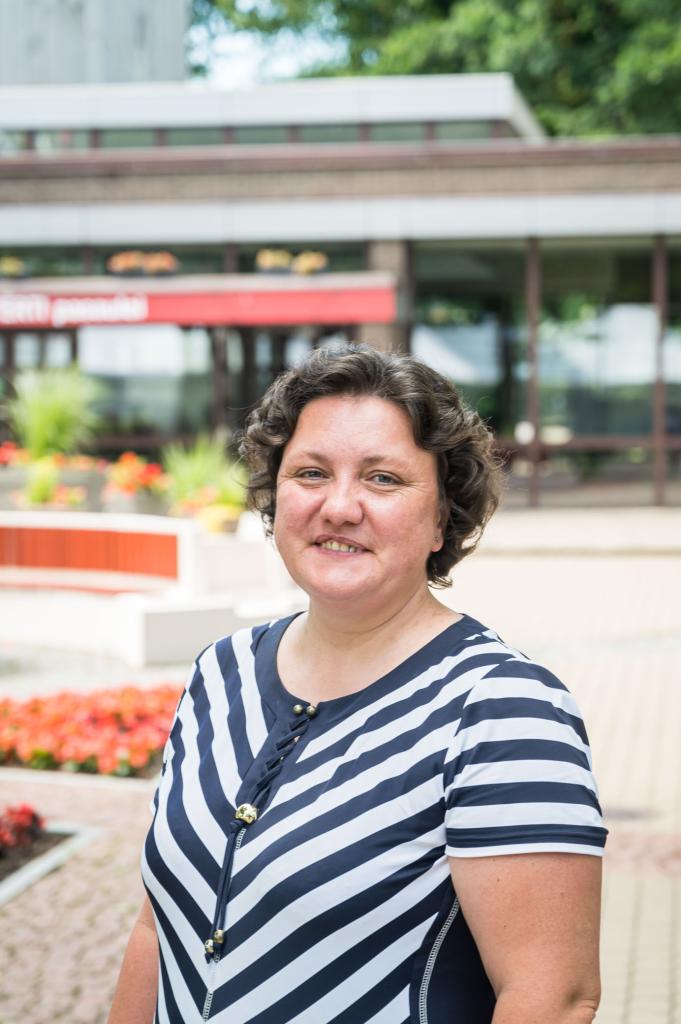Tenured Professor Dace Pjanova: ‘Research and practice go hand in hand’
Dace Pjanova (pictured) is a tenured professor at Rīga Stradiņš University (RSU) who started working at the University in April this year. The young researcher obtained her doctoral degree in biology from the University of Latvia, completed part of her doctoral thesis at the University of Leeds in the UK, continued her scientific career at the Latvian Biomedical Research and Study Centre (LBMC), and now is a researcher at the RSU Institute of Microbiology and Virology.

‘After I defended my doctoral thesis, I established a good collaboration with the University of Leeds. The Latvian research team has worked together with them on a joint international consortium on the genetics of melanoma. This is how my interest in genetics and heredity of melanoma started’, Pjanova explains her work in research. She also studied this topic at the LBMC, broadening her academic interests over time, as hereditary melanoma is a narrow and specific topic. Pjanova started to study melanoma risk factors, issues of melanoma therapy resistance and immunomodulators. She plans to develop these topics at RSU as well by creating a multidisciplinary research group.
Why did you continue your research career at RSU?
I wanted to link theoretical and practical research, as RSU has closer collaborations with clinics. I hope that in this way, the research that has been developed in theory can be put into practice and made available to patients.
At RSU, I will continue to develop my academic interests and mainly work in the field of immuno-oncology. My idea is to establish and develop a research team that will work with a wide range of laboratory techniques, study cell cultures by visualising cells, process data and link it to molecular biology, for example by isolating and analysing nucleic acids. This research is at the gene level: we look at both gene changes in the form of mutations and at clusters of changes at the level of gene expression, or the so-called transcriptome level. At the transcriptome level, we can see which genes are currently active and which are suppressed, how the activity of genes changes when we apply drugs. I want to study both at the cellular level with molecular biology techniques and also on a larger scale to see if the processes we have observed at the cellular and molecular level can also be seen in patient material. I would also like to explore the possibilities of combination therapies.
I think any researcher’s dream is to do something to combat diseases. In my case, it would be to eradicate tumours. I do not know if it is possible in my lifetime, or if it is even possible at all, but it is possible to do something to move towards that goal.
What kind of team do you want to build at RSU?
The aim is to build a stable team of researchers who work with the latest methods and to promote international cooperation, because science is not local, it is global. These are the steps to take in order to move towards a bigger goal – new methods, therapies, breakthroughs in oncology.
The team will be interdisciplinary. I expect molecular biologists, geneticists, cell biologists, physicians to join the team. We will try to attract funding from different projects and develop this working group. The first step has already been taken with a Latvian, Lithuanian, and Taiwanese project application in early May. Next, I see opportunities to participate in various European Union projects by making use of new “hop-on” calls, and also to try to get involved in the consortium’s activities. Then we need to look for more opportunities, for example with existing cooperation partners.
International projects, cooperation, networking is an important goal to aim for. I have already gained some experience and I am still involved in an international consortium on melanoma genetics with regular conferences and projects. It is important to build on existing contacts and to make new ones.
What will be on the new RSU working group’s agenda?
To attract money for the chosen research areas and to define tasks in more detail. Then the group should introduce necessary research methods into the group to be formed and look at ways to complement them with the latest research methods in the field, including those that allow analyses at the level of a single cell, such as single cell sequencing or spatial gene expression analysis.
We plan to continue developing a comprehensive approach to treatment. Recently, immunotherapy has rapidly entered the field of tumour therapy, with good results. Immunotherapy stimulates a person's immune cells to fight the tumour, but it only helps a fraction of patients. Scientists are looking for different markers to identify who is helped by this therapy and why. I think we could also participate in projects regarding this field.
Right now it would be important to develop a comprehensive approach with the tools that we have available, for example we can detect the amount of mutations in a tumour, we can detect the state of so-called control proteins on a patient's T cells (in the context of checkpoint inhibitor therapy), and we can look at soluble markers. Then put the data together and decide what therapy might be appropriate for the patient, create immunograms together with an immunologist and see the overall immune status.
Developing such a comprehensive therapy is a step towards personalised treatment, and it could be implemented in cooperation with a clinic. This would be the immediate practical goal.
Immunotherapy is a promising field and there are different types. Checkpoint inhibitor therapy, as mentioned earlier, works well in practice today. The simple explanation is that tumour cells put the brakes on the immune system so that it cannot destroy them, but this treatment removes those brakes and allows the immune system to function. Not all patients benefit from this treatment, so other ways need to be explored.
It is important to understand why certain treatments helps some patients and not others. Figuring this out should be on our to-do list. Creating new medicines would be a far-reaching goal, but first we would need to understand exactly who needs medicines and how they work. Developing drugs is a very long process. What is important now is to focus on the mechanisms of cancer development, to understand which factors to target. Then we can think about appropriate therapies. It has always been important for me to understand how something works. What we know about cancer is that it is very diverse: if we study one thing, several other things come up that we do not understand. I want to understand how to navigate this question.
I have gained experience in oncology by studying melanoma, which is a good model to navigate in oncology, because the basic mechanisms of action and evolution are similar in all types of cancer. Melanoma also has targeted therapies, because about 60% of melanoma cells have a specific mutation in the B-RAF gene. Therapies have been developed that destroy these mutated cells. This prolongs people's survival, but eventually resistance sets in, which we can try to circumvent with various immunotherapy methods, such as checkpoint stimulators and other methods.
Are others in Latvia exploring these topics?
Immunotherapy methods are certainly being used in practice in personalised treatment, and patient material is analysed, but there is no group of researchers studying melanoma oncology at a fundamental level.
This would be a unique group of researchers at RSU in Latvia, which would focus on melanoma and not only on oncology.
I would also like to see students in my working group so that I could guide them in their research.
Related news
 Sports psychology study on young athletes: how burnout, anxiety, and wellbeing shape distinct athlete profiles Research, Psychology
Sports psychology study on young athletes: how burnout, anxiety, and wellbeing shape distinct athlete profiles Research, Psychology


